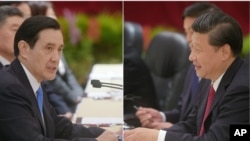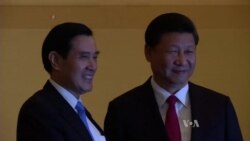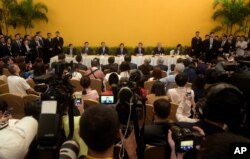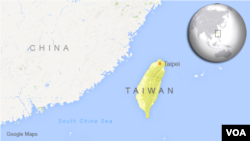Taiwan President Ma Ying-jeou said the importance of security and dignity to the Taiwanese people was one of the key messages he shared with China’s President Xi Jinping Saturday, when leaders of the two sides met for the first time in more than six decades.
During an hourlong meeting, Ma told reporters, he raised concerns about China's deployment of missiles across the Taiwan Strait. Ma said Xi said the missiles are not aimed at Taiwan.
“I especially emphasized that the two sides must base our ties on integrity, respect, clarity and good will in order to narrow the distance between the two sides. So I specially mentioned that both sides should turn hostility into friendship, and seek peace, not war,” Ma told international media representatives in the ballroom of Singapore's Shangri-la Hotel.
China claims that Taiwan is part of its territory and that it must unify with the mainland. Beijing has never renounced its option to use force to resolve the dispute.
US reaction
The U.S. State Department welcomed the meeting and what it called the "historic improvement" in cross-strait relations in recent years.
In a statement, the State Department said the U.S. has a deep and abiding interest in peace and stability in the Taiwan Strait.
"We encourage further progress by both sides toward building ties, reducing tensions, and promoting stability on the basis of dignity and respect," it said.
Xi did not speak with reporters after the leaders' meeting, but he did make brief remarks before the talks began. The Chinese president, like Ma, stressed the mutual desire to develop relations peacefully.
WATCH: Let's Base Ties on Respect, Goodwill, Taiwan's Leader Tells Xi
However, neither Xi nor the official who spoke to the media on his behalf after the talks showed much flexibility. Xi said China’s position is resolute, that Beijing will never accept one Taiwan or one China, or even two Chinas, on the global stage.
"Sixty-six years of development of cross-strait relations has shown that no matter how much difficulties compatriots on both sides have been through, no matter how long we have been separated, no force can keep us apart,” Xi said. “We are brothers linked by blood. Bones may be broken, but they are not split, we are one family."
Public opinion polls in Taiwan indicate an increasing number of residents identify themselves as Taiwanese rather than Chinese.
Democracy vs ethnic identity
One commentator for Taiwan’s Formosa TV said Taiwanese are more concerned about "minzhu," or democracy, than "minzu" or ethnic identity.
“Taiwan’s Mr. Ma Ying-jeou did not even mention the word democracy, a core value of Taiwan. Democracy is the Taiwanese people deciding their own fate. The people of Taiwan will determine their future,” she added.
Tsai Ing-wen, who heads the Democratic Progressive Party and is considered the front-runner in Taiwan's presidential election, said Saturday she was disappointed Ma made no reference to preserving the island's democracy and freedom during his historic meeting with Xi. She spoke to reporters from Yunlin, Taiwan.
Currently, Xi said, the people of both sides face a decision on developing cross-strait relations: In which direction and what path they should travel.
“We sit together today so the historical tragedy will not be repeated, the achievements of the peaceful development of cross-strait relations will not be lost, compatriots on both sides can continue to live a peaceful life and the coming generations can share a bright future," Xi said.
During the meeting the two agreed to establish a hotline for quick communications on urgent issues.
Since Ma stepped into office in 2008, Taiwan and China have signed 23 trade agreements. But it was not until the talks in Singapore that the two sides' top leaders were able to meet, just two months before Taiwan holds presidential and legislative elections.
Upcoming Taiwan election
Disclosure of the Singapore meeting on short notice, just days before it took place, triggered protests in Taiwan.
Some there voiced concern about the closed-door nature of the talks, while others questioned what motivated Ma and Xi to hold their meeting so soon before what could be an historic election in Taiwan.
The opposition Democratic Progressive Party is leading Ma’s Nationalist Party in the polls, and indications are the Nationalists could lose both the presidency and the legislature for the first time. The elections are scheduled for January 16.
Ma has denied that the meeting has any connection to the elections.
China's state-run media emphasized the Xi-Ma meeting news coverage, but state broadcaster CCTV switched away from its live broadcast when President Ma spoke briefly before the private talks. Chinese media also did not broadcast Ma’s remarks to reporters afterwards.
Image building
For China, some say the meeting is the latest effort to smooth over its perceived image as a regional bully.
China has come under intense scrutiny recently over its territorial claims in the South China Sea, so it could be helpful to make some headway with Taiwan and soften the two sides' long-standing dispute.
Singapore was the place that lower-ranking representatives of Taiwan and China met for the first time in 1992. A visit by Xi had been scheduled in advance during his current regional tour.
Before arriving in Singapore, Xi also visited Vietnam, which saw an outpouring of anti-Chinese sentiment and violent protests last year after Beijing parked an oil rig off Vietnam's coast.
VOA's State Department correspondent Nike Ching contributed to this report.








